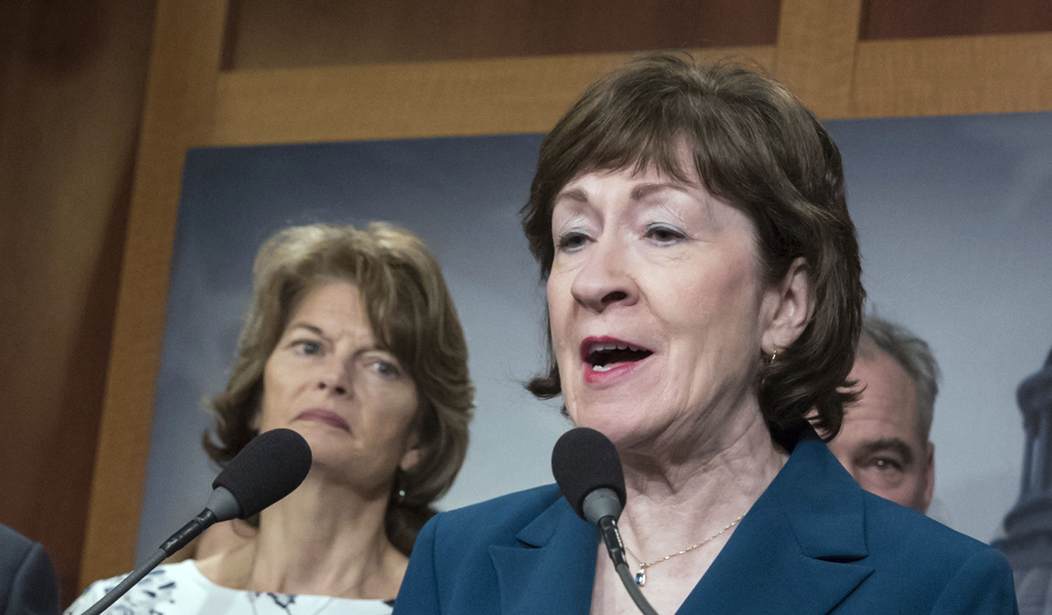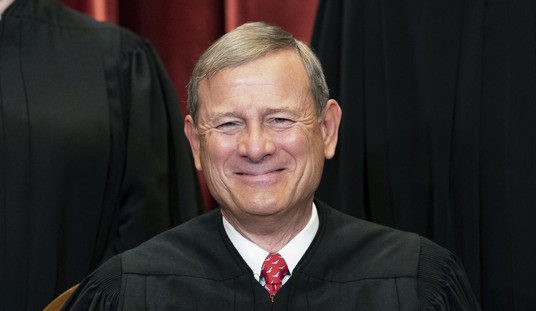A line in the sand, or a cover for political hindquarters? That’s the question as Donald Trump cogitates on his second opportunity to leave a legacy on the Supreme Court. The only two votes that matter, Susan Collins and Lisa Murkowski, met with the president yesterday to discuss their views on potential nominees, along with the three Democrats who voted for Neil Gorsuch, and Roe was very much on their minds.
Collins emphasized stare decisis on abortion law yesterday:
Collins said Thursday that although she wouldn’t ask Trump’s pick how he or she would rule on specific issues, she always presses judicial nominees about their views on legal precedent.
“I do get a sense from them on whether or not they respect precedent,” Collins said. “And from my perspective, Roe v. Wade is an important precedent and it is settled law.”
The issue of stare decisis always makes for interesting confirmation-hearing conversation. It doesn’t require nominees to pledge complete fealty to the doctrine, but usually they will offer up the usual paeans to continuity and reliability, which are undoubtedly necessary for the rule of law. When prior decisions abuse the Constitution and liberty, however, the court has to be free to act — and they have on notable occasions, such as the court did this week on Abood.
At any rate, it sounds as though Collins wants to take a tough public line on abortion but avoid the impression of a litmus test. Murkowski made it clear that while she’s concerned about Roe, it’s one of a number of issues that will go into her decision:
Murkowski called the future of Roe v. Wade — the 1973 decision that legalized abortion nationwide — a “significant factor,” but she stressed that in no way will that landmark ruling be the sole factor for her.
“And I don’t think it should be the only factor for anybody,” Murkowski said. “It’s not as if those are the only matters that come before the Supreme Court.”
It’s tough to know how to read this, almost certainly by design. Are Collins and Murkowski trying to signal to Trump that he’d better pick a pro-Roe jurist (or at least one who hasn’t been explicitly anti-Roe) without suffering conservative blowback for a pro-abortion litmus test? Or are the two trying to offer some rhetorical support for Roe as a cover for agreeing to support anyone Trump nominates who hasn’t pledged publicly to overturn it? Ah, circles within circles. Stay tuned!
However, it may not matter as much as some think. The only justice that has publicly declared support for reversing Roe is Clarence Thomas, I believe. Everyone else on the court has brought up stare decisis whenever the topic came up. Chief Justice John Roberts has been stung enough with accusations of political bias that he went against Kennedy to uphold ObamaCare, and it seems unlikely that he’ll swing for the fences without a clear consensus on the court. The more likely risk is that five solid conservatives might whittle away at Casey instead and allow more state restrictions on abortion, but even that would be contentious. Replacing Kennedy isn’t the real existential crisis for the abortion industry; having Trump replace one of the liberal justices would be.
If they did overturn Roe, though, the issue would rapidly return to electoral politics, as the LA Times notes. How that would play out is anyone’s guess, though:
In a number of states where voters are closely divided on the issue, the emotional politics of abortion likely would lead to a new period of political turmoil, where power could shift around an issue that for decades has not been a top concern for most voters.
“If the court rolls back Roe vs. Wade, abortion will become front and center of every state political debate and campaign,” said Patrick Egan, a political scientist at New York University who has studied public opinion on the issue. “The extent to which states prohibit or make it more difficult to access legal abortion could become the battleground in the politics of many states for decades to come.”
More than two-thirds of voters nationwide support keeping the Roe vs. Wade ruling intact, according to a poll conducted last year by the nonpartisan Pew Research Center. Yet the politics of abortion get murky when voters are asked about specific restrictions. In several swing states, voters are closely divided, which could worsen the political tumult if the Supreme Court returns the issue to state control.
That could add a new, unpredictable degree of volatility to the politics of swing states.
It would return accountability for public policy to elected officials rather than unelected judges. Hashing this out in elections is precisely the purpose elections serve. Even so, don’t expect a reversal on Roe even if Amy Coney Barrett or William Pryor get the nod and survive to confirmation.








Join the conversation as a VIP Member